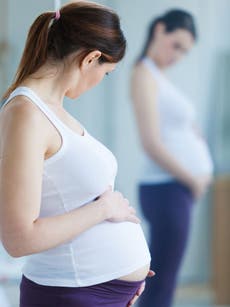The cash-strapped NHS should not offer womb transplants, when so many children are in care
Is the right of any woman to give birth a priority that supersedes the funding of costly drugs that can prolong life for all and reduce the impact of dementia?


Should a woman’s right to have a child be available on the NHS, given that cash is so short that some family doctors are being offered financial incentives not to refer patients to hospitals?
Advances in medical science offer exciting choices, but should the state pay for costly treatments which don’t necessarily prolong life or cure terminal illness? Womb transplants are going to be carried out on 10 women in the UK next year, after a successful procedure in Sweden resulted in the birth of a healthy baby boy.
These operations will be funded by private donations, carried out by the Imperial Healthcare Trust at a total cost of £500,000. Then, the NHS will face a difficult dilemma. After the inevitable lengthy period of consultation, it will be interesting to see whether public opinion forces it to offer womb transplants using strict guidelines, as it does with IVF.
Why not be brave, ignore the emotional appeals and say, right now, that this is one medical advance we can’t afford? Sorry, but the cash has dried up. If the public wants childless women to be mums – shunning other options such as surrogacy and adoption – is it prepared to pay a higher rate of national insurance? Is the right of any woman to give birth a priority that supersedes the funding of costly drugs that can prolong life for all and reduce the impact of dementia?
After receiving their new wombs, the women involved will be offered the chance to give birth to one more baby before the womb is removed (another major operation) to prevent the risk of cancer from the side effects of the huge number of immuno-suppressant drugs they will have to take. Doesn’t that sound like putting your body through a ghastly experience, just to carry the baby yourself?
The NHS has already got itself in a terrible mess by offering IVF treatment for infertility at a cost of about £3,500 a course. A postcode lottery means that depending on where women live and the financial state of their local authority, they can be offered between one and three courses if they meet strict criteria. The NHS funds 40 per cent of all IVF treatments in the UK, which can cost between £6,000 and £15,000 per cycle privately. There’s still a 75 per cent failure rate, and a waiting time of up to two years. Women aged between 40 and 42 get only one chance.
Fertility is still an under-researched area, but why do so many couples spend a fortune on IVF with all the mental agony that it involves, and then produce a second child naturally? I’m not sure why the bankrupt NHS offers IVF at all, when there are so many unloved and unwanted children in the UK. Why does giving birth have to rank as a divine right over all other medical conditions? I’ve never been bothered about missing it, though I’ve cared for two stepchildren at different points in my life.
In 2014, there were almost 69,000 children in care in England but only 5,050 adoptions, 91 per cent of which are to heterosexual couples. Granted, the authorities don’t help people who want to adopt: the average waiting time between taking a child from care to placing them in a new home is 534 days, which is shocking. In Kent alone, there are currently 720 children in care who have arrived on our shores unaccompanied, fleeing war zones and claiming asylum. These poor kids have no relatives here, and their number grows daily.
Our society is inward looking; we want children that are of our flesh and blood. I’m not denying a woman’s right to give birth, but don’t expect me to pay for it.
Whatever happened to good, old-fashioned sales assistants?
Online shopping is rapidly replacing the three-dimensional experience, so retailers are desperate to find a way to persuade us to make the journey to their stores in person.
Kate Spade, an upmarket US clothing and accessory brand, has decided to rename its sales assistants “muses” who will entertain you and help in all sorts of ways, offering free candles and birthday cards. The company explained that the “muses” will create an “authentic experience” – which isn’t all about getting you to part with your cash, because, instead, you’ll be taken on a “guest journey” through the shop.
Previously, in-store staff were known as “sales associates”; God forbid they should be tagged anything as demeaning as a shop assistant. According to Kate Spade’s spokesperson, workers find their new job description “incredibly empowering”.
This isn’t the first company to rebrand staff; Disney calls its workforce “cast members”. I think we might have stumbled on the follow-up to the much-missed comedy series Twenty Twelve and W1A, set in a designer store where muses offer scented candles and read your chakra. I can’t see it catching on at Aldi or Tesco.
Dinner for one – Britain’s epidemic of sole diners
Probably the most poignant story I read this week was the result of a poll conducted by BBC Good Food, which revealed that one in four of us eats our main meal completely alone on most days. Even more depressingly, more than three-quarters of the 5,000 participants admitted they never invited friends or family around to share a meal.
There are more people living alone than ever, as a result of divorce and an ageing population. Night after night, we sit eating our meals for one on our laps watching the telly, where cookery programmes dominate, none of which acknowledges the rise of the single diner. Most of the creations on The Great British Bake Off would feed a small WI meeting. Recipe books routinely give quantities for tables of four to six.
Meanwhile, the televising of food is nothing to do with nutrition and everything to do with new forms of family entertainment. The Likely Lads and Morecambe and Wise have been superseded by Paul Hollywood and Nigella, and travel shows like Rough Guides or the Holiday Programme replaced by Rick Stein and the Hairy Bikers, who combine an undemanding travelogue with a spot of peasant cuisine.
I like initiatives such as the Big Lunch, where whole streets hold a festive meal together once a year, but now we need to come up with a way to encourage community cooking – getting neighbours to meet once a week to chat over a casserole. Loneliness is the secret killer in modern Britain.
Perhaps a new, kinder politics will include women
Jeremy Corbyn defines “kindness” as the mantra guiding his policies, and it’s certainly attracted a lot of new members to the Labour Party. Making his keynote speech in Brighton last week, the Labour leader looked like Father Christmas handing out presents, carefully concealing the price tags for fear of denting the euphoria.
I’m all for a new caring, sharing kind of politics. Perhaps it will favour Zac Goldsmith’s campaign to become London mayor, as he is one of the nicest chaps in Westminster. But can personality triumph over real policies? Surely we expect leaders to make unpleasant decisions on our behalf.
Women are supposed to be more in touch with their emotions than men, so perhaps the time has finally come for one to lead the country. It’s been a long time since Maggie stood down. Nicky Morgan thinks she could lead the Conservatives, and Sandi Toksvig has had a glam makeover, ready to start fundraising for the Women’s Equality Party, which will be putting up candidates at the next general election. Let’s hope more clever women take advantage of this new mood.



Join our commenting forum
Join thought-provoking conversations, follow other Independent readers and see their replies